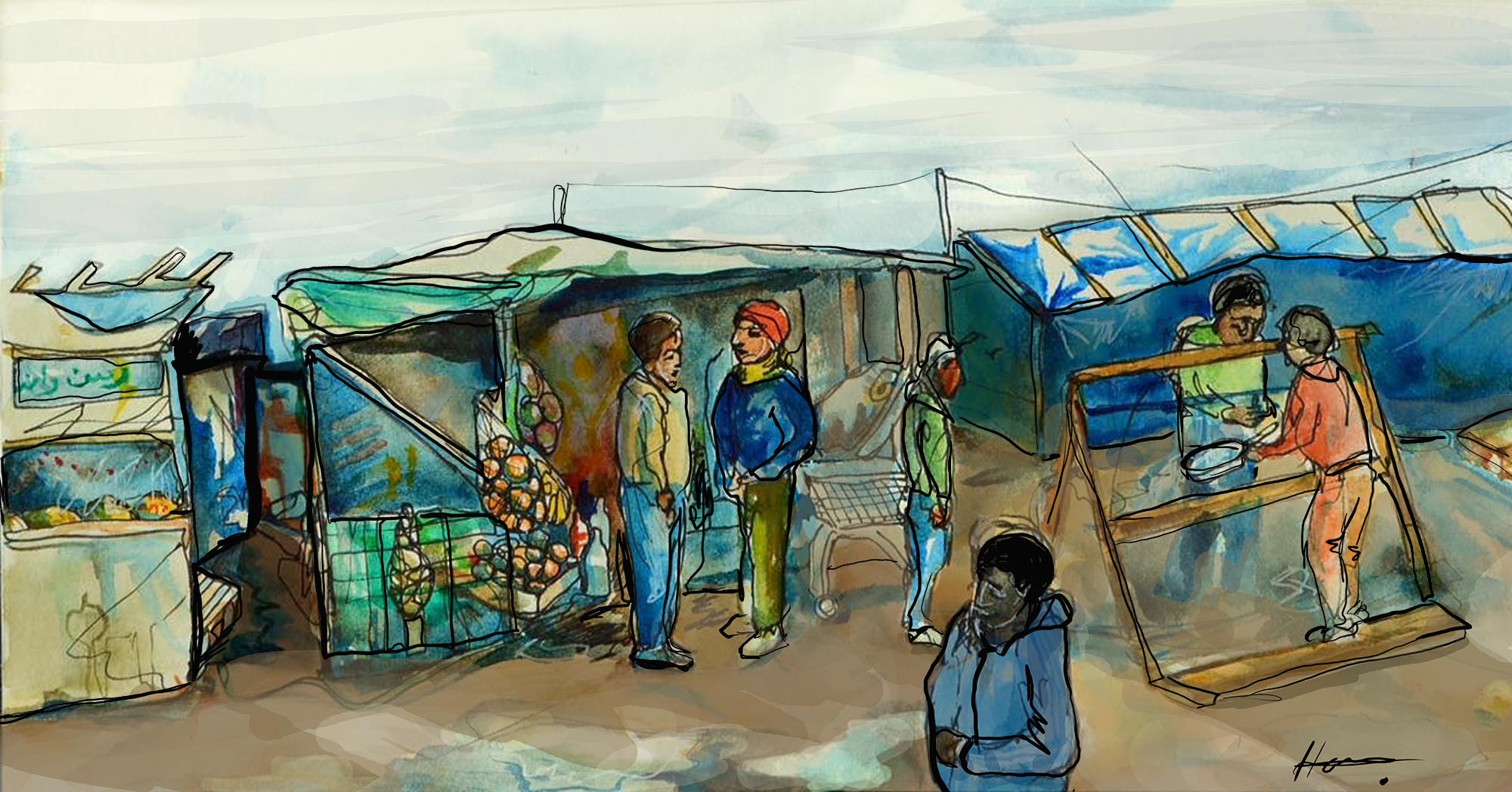Burnt homes and broken promises: the Jungle evicted
- October 31, 2016
Borders & Beyond
Chaos and confusion prevail as the autonomous migrant camp in Calais is being cleared, but few have any doubts that before long new Jungles will arise.
- Author
Last week saw the brutal destruction of the Calais Jungle, Europe’s largest unregulated refugee camp and home to around 10,000 people who have built communities, collective solidarity and even an autonomous economy. The eviction of the camp yet again calls into question Europe’s asylum policy as refugees who have fled war, persecution and destruction once again witnessed their homes and community spaces razed to the ground, this time as part of a “humanitarian effort”. French authorities declared on Wednesday that the camp was empty, but hundreds of people — including unaccompanied minors — remain in an incredibly precarious position, sleeping rough and at risk of arrest.
Unlike most refugee camps in Europe where food and facilities are provided by authorities, the Jungle evolved as a relatively autonomous entity, more like a shanty town than a camp. Restaurants, shops, barber shops and community spaces lined the muddy high street, which served not only as small commercial enterprises, but also as spaces of collective solidarity where people would gather, share information and build their community. Without these networks of support, the experience of being a refugee is infinitely more isolating and confusing.
The Day Before the Eviction
The day before the eviction a tense, uneasy mood settled among the residents of the Jungle, many of whom decided to leave on their own terms. Rather than giving up their autonomy and freedom for a place on one of the state provided buses to “Healthcare and Advice Clinics” (CAOs) and detention centers across the country, they left before they could be forced to leave, traveling to Paris, Marseille, anywhere they might have friends or hope of finding shelter.
In one of the few restaurants which remained open, people attempted to keep a brave face as they spent the last day among friends with whom they had spent the last few months, years even. Some were resigned to whatever might happen the next day, throwing out light hearted comments to disguise their apprehension, “we’re not scared of the police! We’re Afghan, the police should be scared of us!”
A young married couple had only just heard the news of the eviction; they were frantically trying to work out how they could avoid the risks of separation, of detention, and of becoming locked into the French asylum system which is already crumbling in its own inadequacy to provide aid, security and safety to the vulnerable. Aged just 18 and 20 years old, they had traveled together from Eritrea, fleeing the horrors of dictatorship and indefinite military conscription, in search of safety and a life worth living.
“I just want a safe place for my wife. We want to build a life together; we can’t live in camps anymore, relying on the state for tiny handouts and waiting in line for food,” exclaimed the young man. The only reassurance they received from a British volunteer was that, as Eritreans, they face little chance of deportation as Europe has finally recognized that Eritrea is an unsafe country, unlike Afghanistan.
A middle-aged Afghani man who had been listening in on the conversation interjected at this point, “who says Afghanistan is safe?! You ask your governments how Afghanistan can be safe, while drones and bombs fall from the sky, who sent them?! While your soldiers patrol our villages, who sent them?! Who is responsible for Al-Qaeda, for the Taliban?! Tell me!”
Afghanis comprise a significant proportion of the Jungle’s residents. In light of a recent EU agreement with Afghanistan which means that European aid money is dependent on the Afghani government agreeing to accept 80,000 deportees, Afghanis stand little chance of being granted asylum in Europe. This man highlighted the painful contradiction felt by so many in the Jungle, that the nations responsible for so much of the violence in their country turn them away when they seek protection. So many have already had their asylum cases denied in various European countries and now expect to be deported. Their long journeys of flight and hope will end right back where they started.
The high street, once a buzzing center of activity, was deserted; the closed shops, restaurants and barber shops reduced to empty shells with broken windows lining a muddy street. The police perimeter was already firmly in place, a man cycling past with plastic bags of clothes was pulled over and interrogated. “It’s just clothes! Nothing else,” he insisted as the policeman in full riot gear roughly pulled out the contents of the bags, revealing just clothes, nothing else.
Misinformation and Confusion
French authorities claimed that 7,500 beds had been made available, that a simple registration procedure would see people onto buses to transport them to three CAOs across the country, or possibly detention centers. Three different lines for single men, families, and minors, marked out by pictograms. This registration would take place on October 24 and 25, with the demolishment of the camp scheduled for the 25th.
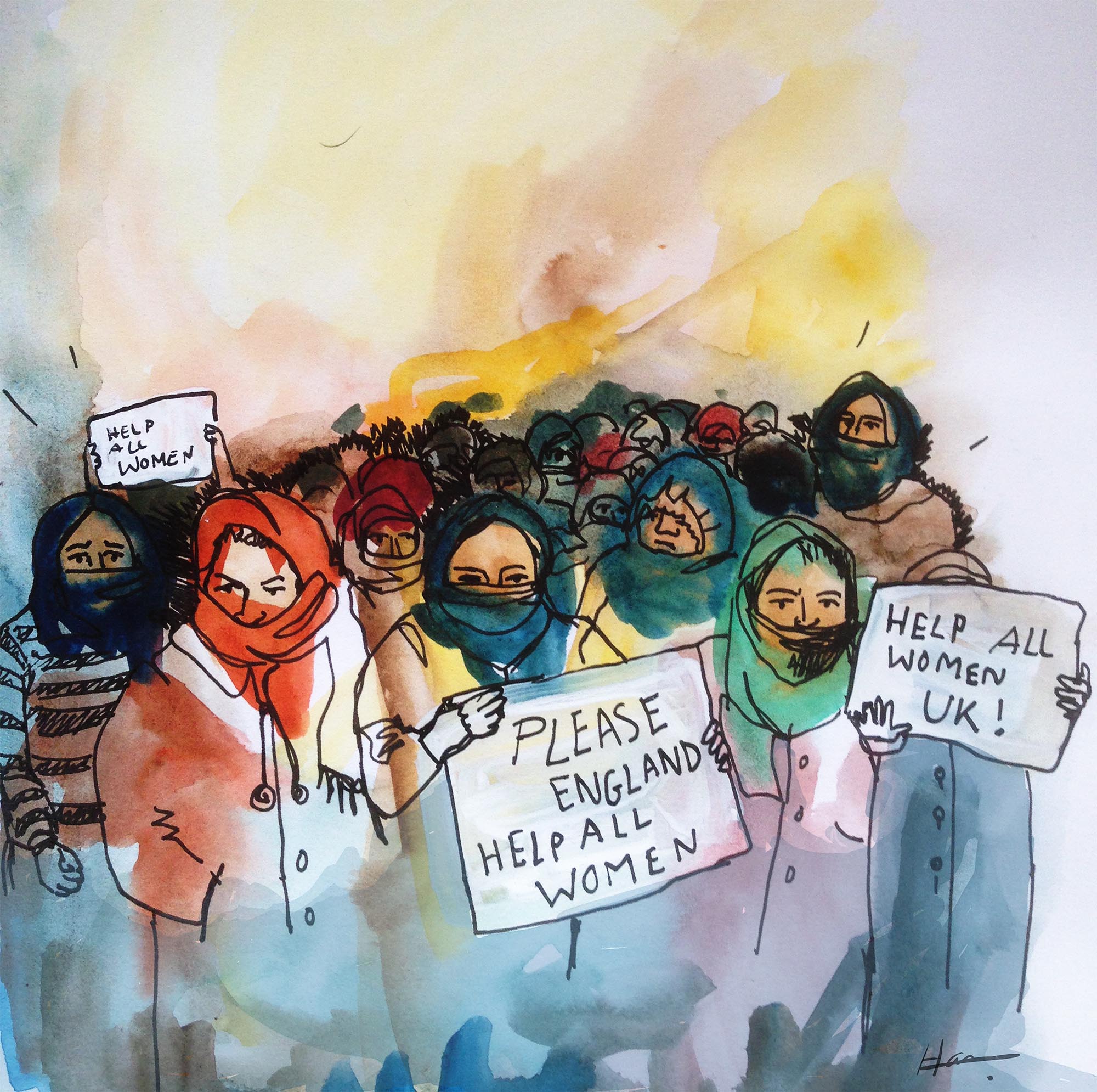 This information had been made available far too late to be translated and transmitted to the many languages and residents of the Jungle, meaning that Monday morning began with an overwhelming sense of chaos, disorganization and misinformation that would come to characterize the following days. Scarce scraps of information were filtered down through various organizations on the ground and painstakingly analyzed by everyone, volunteers and refugees alike, in an attempt to understand what was happening.
This information had been made available far too late to be translated and transmitted to the many languages and residents of the Jungle, meaning that Monday morning began with an overwhelming sense of chaos, disorganization and misinformation that would come to characterize the following days. Scarce scraps of information were filtered down through various organizations on the ground and painstakingly analyzed by everyone, volunteers and refugees alike, in an attempt to understand what was happening.
As Clouchard states, “misinformation is to democracy what propaganda agencies are to totalitarian states”. In the context of this eviction the lack of information felt like not just an organizational slip-up, but a deliberate attempt to misinform and mislead people. In the confusion that ensued, people were unable to take balanced, well-informed and empowered decision about their futures; instead, they were herded onto buses that they didn’t even know the destination of.
At one point, volunteers tried to hand out maps, to enable refugees to decide between the three locations that were supposed to be on offer to them. Officials shouted back, “this is not allowed, people don’t have a choice, don’t give them a map!”
The Registration Process
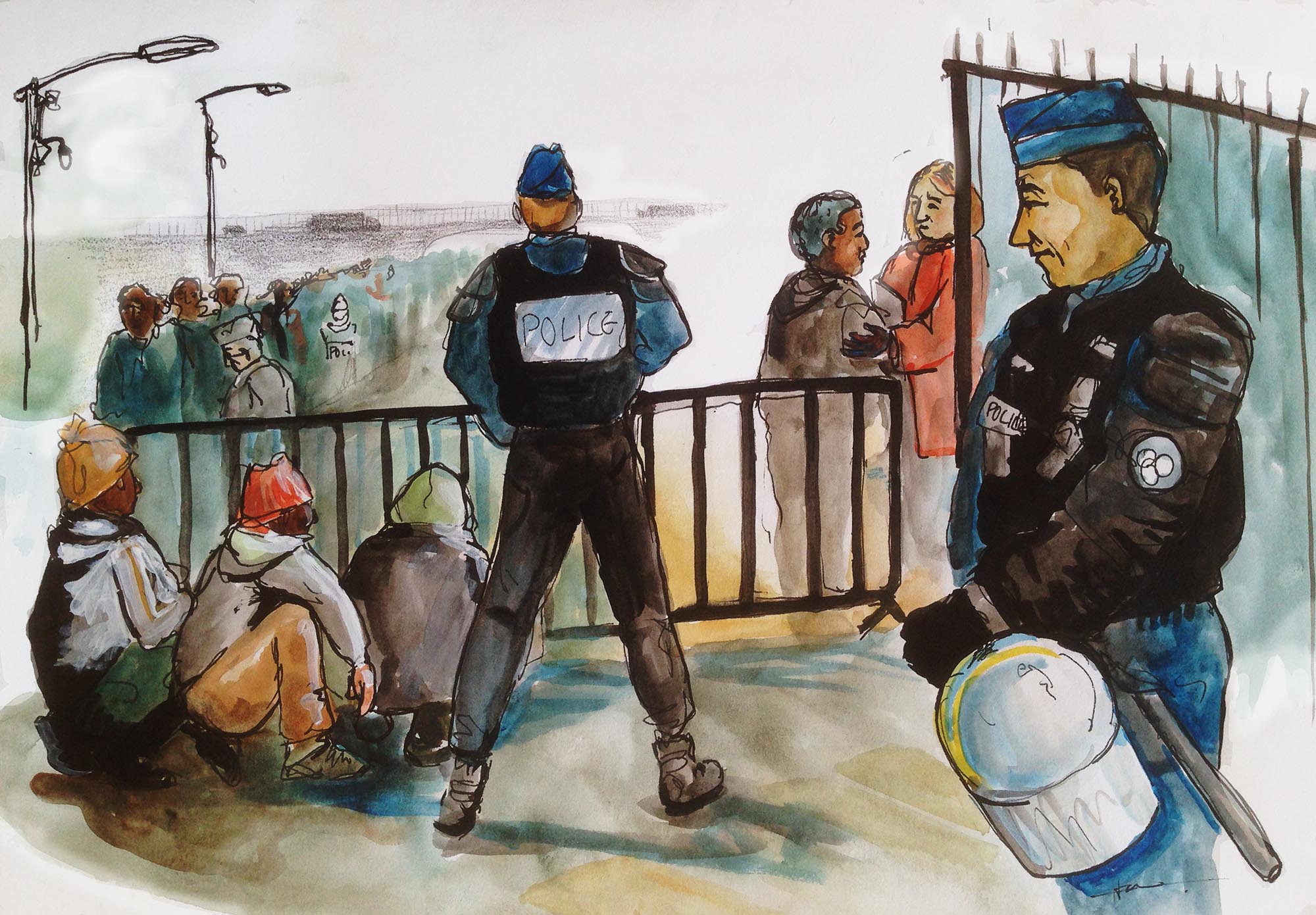 With a heavy media and police presence the mood was subdued and access was restricted to accredited media (500 people) and a handful of volunteer organizations. Inside, people packed up their homes and belongings in the cold, gray morning light and headed towards the police lines for registration. The long line of unaccompanied minors waited for their futures to be determined by one woman peering into their face for about 30 seconds to decide if they were under 18.
With a heavy media and police presence the mood was subdued and access was restricted to accredited media (500 people) and a handful of volunteer organizations. Inside, people packed up their homes and belongings in the cold, gray morning light and headed towards the police lines for registration. The long line of unaccompanied minors waited for their futures to be determined by one woman peering into their face for about 30 seconds to decide if they were under 18.
Inside the Jungle however, far from the complete chaos which everyone had been expecting, there were pockets of relative normality as those who did not want to take the buses busied themselves with their daily lives, cooking lunch for their children, playing guitar.
As for the official demolition, the police cordoned off a tiny section of the camp and invited journalists to watch as they carefully dismantled it. When the real demolition began the following day all access to the high look-out point in the camp was restricted to journalists, where they would have been able to see the bulldozers and cranes destroying houses, and countless fires breaking out across the camp.
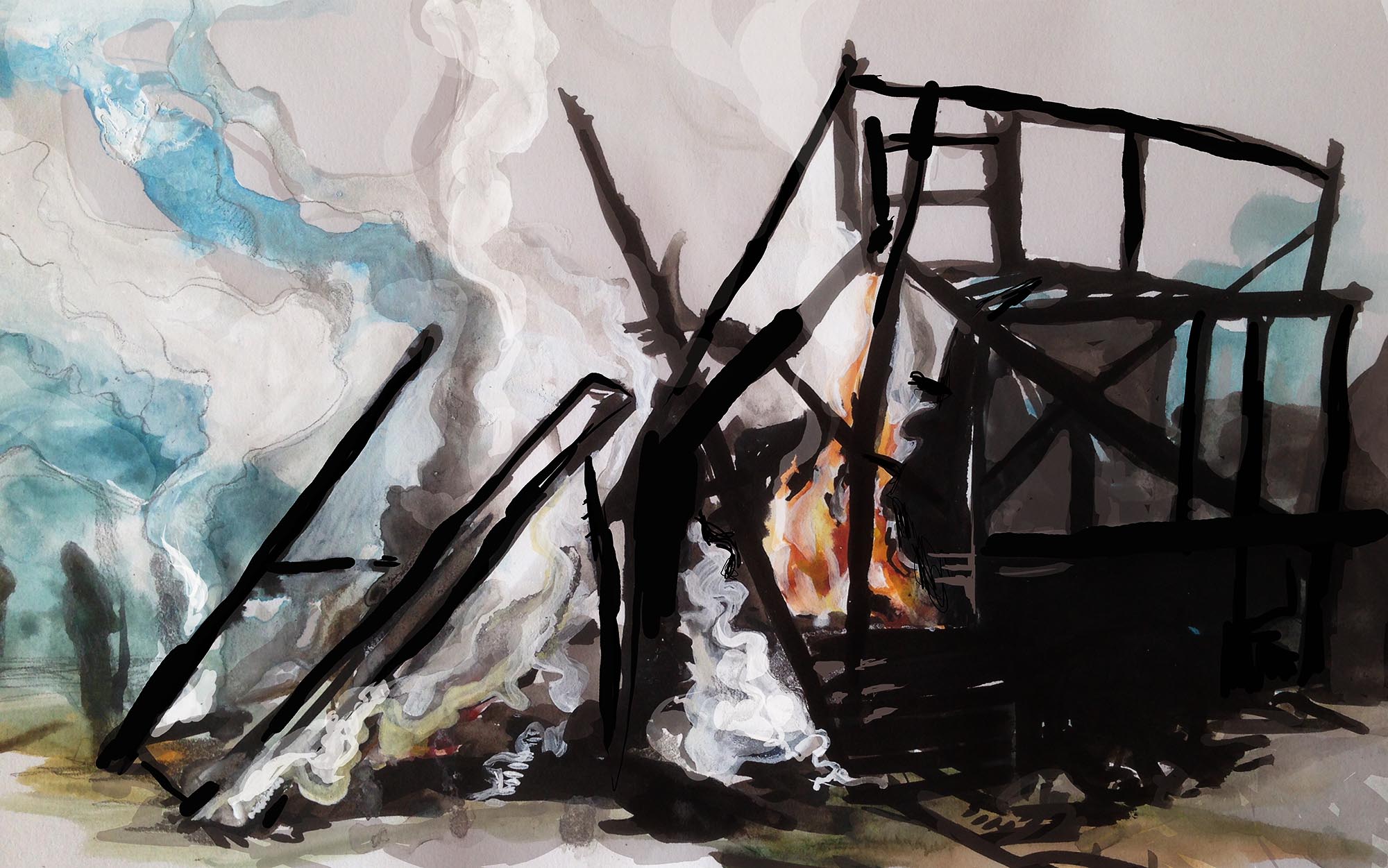 One of the most noticeable homes on fire was a beautifully constructed two-story building complete with a terrace. The inhabitants had set the house on fire themselves as a symbol of protest; they did not want their home and their memories to be destroyed at the hands of the police. As the smoke climbed into the sky, they laughed and reminisced about their past years in the Jungle. Only three people of a community of more than twenty were left, everybody else had already left, to Paris, to flats in Calais; not a single one was planning on taking the bus.
One of the most noticeable homes on fire was a beautifully constructed two-story building complete with a terrace. The inhabitants had set the house on fire themselves as a symbol of protest; they did not want their home and their memories to be destroyed at the hands of the police. As the smoke climbed into the sky, they laughed and reminisced about their past years in the Jungle. Only three people of a community of more than twenty were left, everybody else had already left, to Paris, to flats in Calais; not a single one was planning on taking the bus.
In the midst of this dehumanizing chaos there were several moments of resistance like this where people, for a brief moment at least, were able to take control of their situation and express discontent. Faced with extreme police repression and no individual rights, these actions were incredibly powerful. Individuals carried flags of their home nations up and down the line of policemen who stood stoic and expressionless in their riot gear. The women of the camp, so infrequently visible that their presence has even at times been doubted, organized themselves and protested against their treatment, calling out for “safety and dignity for all women! Underage, overage, we’re all the same! In [camps in] Paris we sleep on the streets!”
The Fire
At about 3am on Wednesday morning a huge fire started, burning all the homes and possessions left behind. A fire which quickly spread out of control throughout the camp and razed it to the ground, leaving the high street looking like a devastated ghost town.
Later, the registration area quickly descended into chaos as people were told that the last buses were leaving that afternoon. The line for minors closed early and hundreds were told to come back the next day. In the midst of this chaos and confusion the destruction of the camp continued in full force as the bulldozers and cranes moved in.
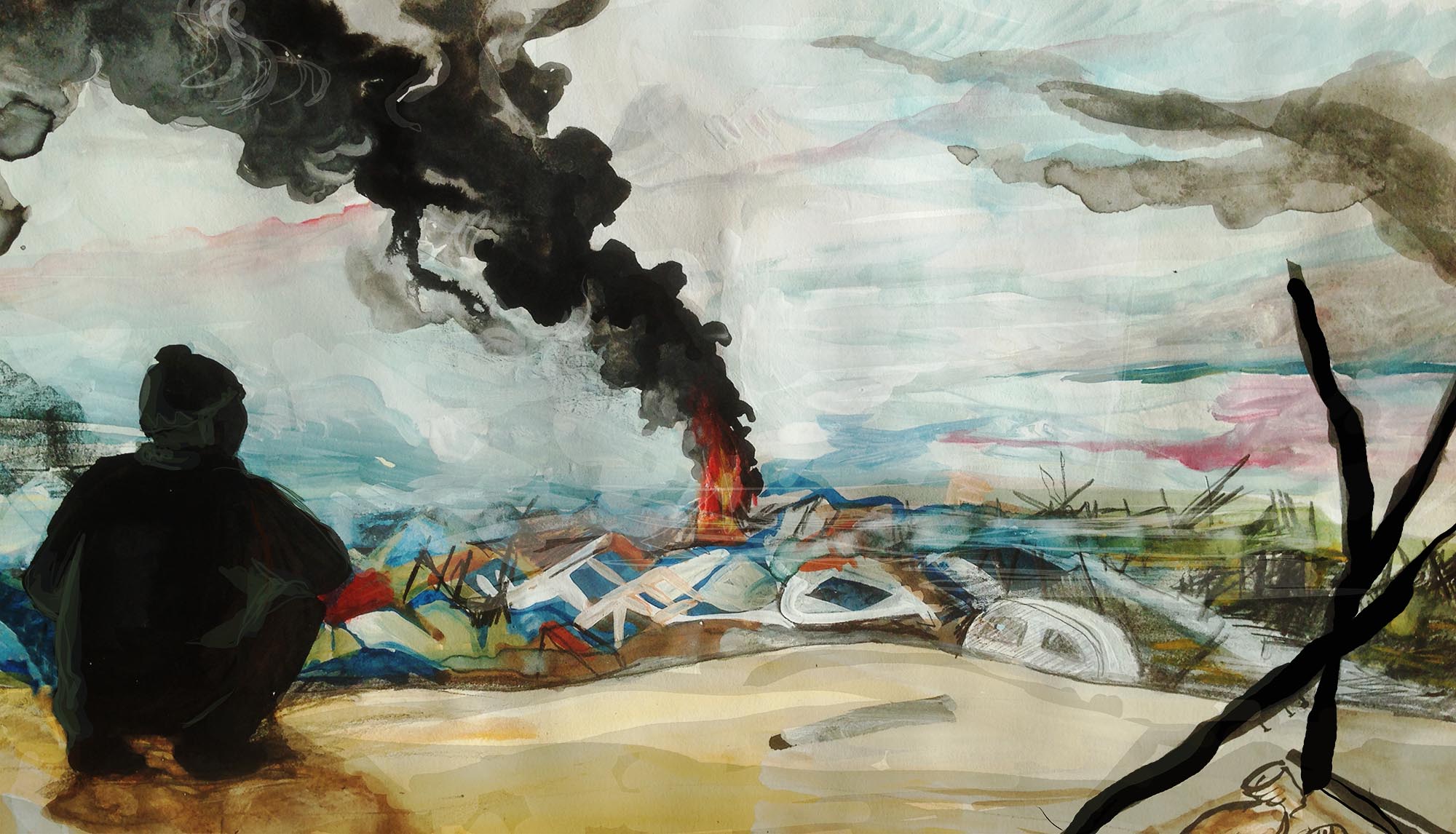 “It’s exactly like the scenes we have run away from, it’s just like watching our homes being burnt by the rebel forces” gasped one young man from Sudan as he gazed upon the desolation and destruction before him.
“It’s exactly like the scenes we have run away from, it’s just like watching our homes being burnt by the rebel forces” gasped one young man from Sudan as he gazed upon the desolation and destruction before him.
After the last buses departed, the French authorities and some media outlets reported that the camp had been cleared and the eviction was a success, ignoring the hundreds left behind. Having been turned away by the authorities for the third day running, children were ordered back into a Jungle which by this time had become an apocalyptic scene of burning buildings, toxic smoke, exploding gas canisters. They had nowhere else to go but the streets, with no information about what options are open to them, if any.
This eviction may have been dressed up as a “humanitarian effort” but the blatant contradictions between the official line of events and the reality on the ground reveals gaping fault-lines in Europe’s refugee policies. With unaccompanied minors left sleeping on the street, then by no stretch of the imagination has this been a successful operation. Rather, this is nothing but a complete failure on behalf of the authorities who are responsible for their protection. If the eviction was planned with the best interests of the Jungle residents in mind, then it would have worked out in a different way.
There has been a refugee camp in Calais since the early 1990s, and after each eviction people have returned to rebuild. Long term residents of the Jungle believe that there is nothing that the authorities can do to stop people coming and trying to reach the UK; they are confident that before long, small camps will spring up again, but without the facilities and systems of mutual cooperation and aid that people have built in the Jungle their survival will be even more precarious.
Source URL — https://roarmag.org/essays/jungle-calais-camp-eviction/
Further reading
Antifascism in the era of Trump
- Ben Reynolds
- November 5, 2016


